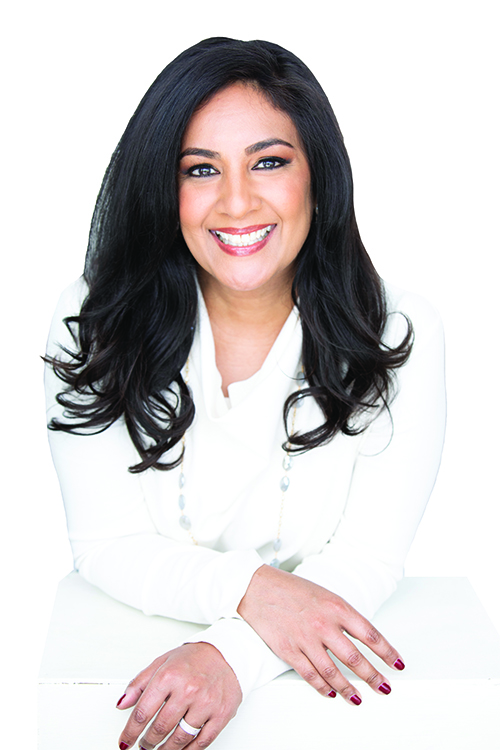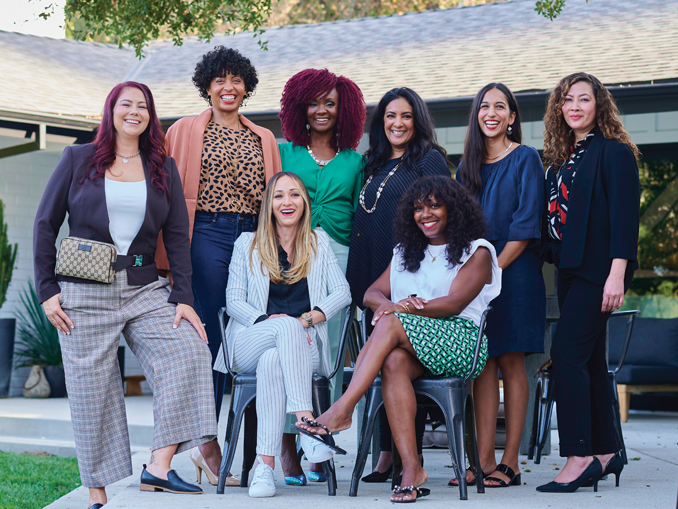by Zoë Billington, Manager of Travel Insights, Pollen, New York, New York, zbillington@gmail.com

Deepa Purushothaman is the cofounder of nFormation, which provides a space for professional women of color (WOC); she is also a program leader at the Women and Public Policy Program at Harvard Kennedy School.
Previously, Purushothaman spent more than twenty years at Deloitte, where she was the first Indian American woman to make partner in the company’s history. She was also Deloitte’s national WIN (Women’s Initiative) leader, the firm’s renowned program to recruit, retain, and advance women. Deloitte is one of the Big Four accounting organizations and the largest professional services network in the world by revenue and number of professionals.
Purushothaman’s new book, The First, The Few, The Only: How Women of Color Can Redefine Power in Corporate America, focuses on the challenges that WOC face in corporate America.
In this interview, Purushothaman talks about the challenges WOC face in the corporate world and how her life and career experiences led her to focus on breaking down barriers and addressing systemic issues.
Family Roots
Zoë: Can you tell me about your background, and what led you to where you are today?
Deepa: To really go back to the beginning, I grew up in a very white town—a small, farm-country town. I was one of the only students of color in my whole school. I think there was always this consciousness of being an “only” without necessarily having the words for it.
My parents immigrated from India, and we didn’t talk about race at home. The idea was kind of like, work hard, do well, and you’ll be rewarded. We didn’t really talk about the fact that we were not white. There were many incidents around racism that I really didn’t have the words for. I have always had a deep sense of not belonging—like what’s going on, I’m different, something feels different—that has been there since childhood.
Rising to the Top in Corporate America
Deepa: Fast forward a bit, I had this amazing career, I really enjoyed what I was doing, and I learned a lot. I ended up in a really big inclusion role. But I also found myself as a “first,” and being a first, you end up not only mentoring other women of color and speaking on a lot of stages to talk about how you rose, but you also spend a lot of time pondering topics like inclusion and advancement, which are outside the job you were hired to do. I also felt a deep sense of responsibility for other women of color coming after me. I wanted to help them rise, so I was always focused on breaking barriers and showing what was possible. I always felt like I was representing everybody else.
So, even though I knew I wanted to leave the corporate world, it took me years to leave Deloitte because I felt responsible to the women of color who were coming up the corporate ladder after me.
The impetus to leave was when I moved to the West Coast and ended up on a large project for Deloitte—one of the biggest projects of my career—and I found myself working 20 hours a day, with really, really tight timelines. Over the course of that project, I started to get sick and had a lot of physical manifestations from the stress and burnout that come with things like that, even when you don’t have to also be navigating spaces as an only and a first. I eventually chose to leave my corporate role after 20 years in corporate America to explore that. Six weeks after leaving, I got my book contract and here I am.
Focusing on Challenges of Women of Color in Corporate America
Zoë: Tell me more about that choice. What gave you the confidence you needed to leave?
Deepa: As I said, it took me a while to leave. In order to figure out if I wanted to stay or go, I started gathering with women of color. Initially, it started one-on-one. I was really just looking for what other women of color were doing two decades into their careers, because I didn’t have a lot of examples of that. Those one-on-one dinners turned into five- to ten-person dinners. Then, over the course of a year, my now-business partner of nFormation, Rha, and I did ten dinners across the country and met over 300 senior women. We’d get into these rooms thinking we’d talk for an hour or two, and we would be sitting there six, seven hours later still talking. It was the first time many of us had conversations about what’s different as women of color? How does the structure show up differently? How does it feel? What are you struggling with?
It felt like there was magic there. There was something really compelling and important to me about doing belonging and inclusion work. Until George Floyd’s murder, we didn’t really talk about race at work, right? There was a strong sense that if you just work hard, you’ll be okay. This idea that corporate America is a meritocracy is really false. I’m asking us to look deeply at how this system shows up, and is it the same for all of us? My answer is No.
Learning about Systematic Inequality from Airplane Design
Zoë: Can you explain why corporate America is not the meritocracy we’ve been promised? Where can we see examples of this?
Deepa: I met with Vernā Myers, who is the vice president of inclusion strategy at Netflix, and I’m asking her to talk about women of color at work, and somehow, we end up talking about airplane design. She says, you know, Deepa, it’s similar to airplane design, because airplanes weren’t designed for moms and for women. Think about where you’re supposed to put your luggage—above your head.
 She says to me, I don’t like the idea that the luggage is going above my head because it could fall on my children. I would never design it that way. Then I share with her that I’m five-foot-one. I used to travel to three cities a week in my consulting job, and boarding a plane was always a stressful process for me. Then I start thinking of all the five-foot-ten and taller men sitting next to me, and how they don’t have any appreciation for the stress and turmoil I am going through just getting on the plane.
She says to me, I don’t like the idea that the luggage is going above my head because it could fall on my children. I would never design it that way. Then I share with her that I’m five-foot-one. I used to travel to three cities a week in my consulting job, and boarding a plane was always a stressful process for me. Then I start thinking of all the five-foot-ten and taller men sitting next to me, and how they don’t have any appreciation for the stress and turmoil I am going through just getting on the plane.
The three of us have such a different experience within the first 15 minutes of getting on a plane. I’m beyond stressed out and feeling like I don’t belong, like I’m too short, like I packed too much—all this self-criticism comes in. She’s wondering, is this going to fall on my child? Meanwhile, the white man is ready to open his laptop and maybe have a drink. He hasn’t had to worry about those things in the same way.
I think this is a great example to show people how a system, structure, company, or workplace can show up differently for each person. The workplace, even in the first 15 minutes of entering, feels different to me than it does to you, than it does to the next person. That’s where I think the work lies—to make space to have those conversations, because you can’t change it if you don’t believe that it’s true.
Rising to the Top of Corporate America Does Not Solve the Problem
Zoë: What else have you learned from other women of color about their experiences in corporate America?
Deepa: Something surprising about so many of the women I met was that they thought that once they got to the top—once they got to the seat—that they would then be themselves, they would then put forth their own agenda, and they would then be in their power. But what they found was once they got to the seat and sacrificed along the way, there was actually more restriction—less ability to be themselves—because there was more expectation that they would fit in. Many of them were out of their power because they were still conforming.
I interviewed over 500 women of color, and so many of them were ill with what I call mysterious illnesses. There were stomach problems, rashes, heart palpitations, adrenal fatigue, headaches, fertility issues—the list continues. The illnesses come from not being seen and heard, and from giving up your power to rise.
Zoë: What does power mean to you, and why does it need to be redefined in corporate America?
Deepa: What we’re telling most people is that it’s important to get to the top, that there’s a recipe to get to the top, and that this is what leadership looks like. Most of us have been told that it looks like the white male leadership that has come before us—and that doesn’t look like us. A lot of us wonder if we can ever become that; yet, as we rise, we become more like that instead of ourselves, because we think we have to do that to be successful. So, the challenge that we find ourselves in, and what we’re trying to remake, is the idea of power and the idea of success. Because if you chase that one way of success that’s been defined for us, most of us are not going to be happy.
I don’t think it’s just women of color either. I think we’re in a moment with COVID where we’re realizing that today’s workplace doesn’t work for anybody. There’s a question around the space that work takes up in our lives, how we want to show up, how much we want to work, and what that looks like. I think what I’m really questioning is whether the version of power and success that’s been defined for us, as women of color, will ever make us happy. I think we need to remake power—because it’s not made in our mold, and as a result, it doesn’t work for us.
Doing the Work Required to Redefine Power
Zoë: How do you think women of color can go about redefining power in corporate spaces?
Deepa: What I’m asking women of color to do is define for ourselves what makes us feel powerful. We get so many messages that we’re not powerful, right? So, my very simple message is you have to decide for yourself what’s important to you, how you want to show up, and what you want to question. That’s work you have to do yourself, and the company has to do work to make space for us and allow us to show up fully and question the status quo.
Zoë: Do you feel that efforts to increase diversity, equity, and inclusion (DEI) in companies are working today?
Deepa: Women of color that I work with will say DEI isn’t working. Maybe it’s a conversation that happens at the board level, but real action isn’t happening because it’s hard and it requires work. It’s not as simple as “let’s implement a project or program,” which is what a lot of companies have done.
For example, companies have checked a box by putting in a chief inclusion officer or DEI leader. But this is problematic because it says it’s one person’s job to care about DEI. It can’t be a one-person job, it must be a company-wide effort, it has to be a leader-wide effort. So, although I love the role, and I think it’s a wonderful way to make sure the topics are covered, we can’t let people get away with the idea that one person will come in and fix it.
The Birth of nFormation
Zoë: What are some proactive steps that individuals can take to make a difference, so that the work doesn’t fall on that one person who a company has deemed to be the sole DEI leader?
Deepa: I tell women of color to focus on the power of me and the power of we. There’s work you have to do on yourself, about what you’ve been taught and what you believe for yourself. Even a simple question like: What do you think of when you think of a leader? As women of color, we’ve been taught that it’s usually a white male executive, or a white male politician, and we need to reframe that. That’s not what a leader is for us, and we need to change those images.
The power of we is finding other people to have this conversation with. Part of why we created nFormation was because we realize that women of color are isolated. I didn’t know some of the things I believed in and had gone through were true for all women of color until I had those dinners. I thought it was just me, struggling, taking things personally—my problem. But, once I got into that room, and I realized ten of us were having a lot of the same interactions, it freed me to realize it is actually happening to all of us. I’m asking us to create community so that we can not only free ourselves and be witnessed and kind of let go of what’s happening to us, but also to make change.
Finally, for allies and coconspirators, we need more listening. We need to make more space to hear how it’s different for women of color; that’s really why I wrote this book. We also need more permission to mess up. A lot of the leaders I work with are so afraid of saying the wrong thing that they won’t even try. Part of what we all need to do is to practice what we’re going to say when we encounter racism in the workplace, or else you’re going to be caught flat-footed like I was with Walter if you haven’t practiced what to say.
Walter
Zoë: Can you talk a little more about this “Walter” figure in your life, and why that interaction was so formative for you?
Deepa: So, I’m sitting next to Walter, we’re congratulating each other on making partner, and I say something about what I’m stressed about. He turns to me and says, “You’re not going to have anything to worry about, you’re a twofer.” The comment is still so clear in my mind, because in that moment, I felt such confusion. He said something that is so hurtful, but I couldn’t even articulate why it was hurtful. I know he’s not saying it to be hurtful—I don’t believe he’s racist. I just don’t think he understands what he just said, that he just cut me at my knees because it makes me question: Does he think I just got the job because of what I represent? Does he think I’m qualified?
He completely took my joy from me. That’s part of my new understanding of power—he doesn’t get to take my joy from me—but I had to learn what the difference was in that process.
The Future Is Bright
Zoë: Thank you for sharing that process with us, Deepa. Looking ahead, what’s next?
Deepa: People have been asking me: Are you asking everyone to leave corporate America? I’m not saying that. There’s a lot of heavy messages in my book, I’m not going to lie. I don’t think this message, with the weight of 500 stories from women of color, has been put out there before. But at the same time, I’m so optimistic. Meeting all these women put me on a different path. It freed me in my own ways and really helped me step into my power.
I’m more excited after having heard all the stories because we’re finally ready to change. With conversations on race happening, and the Great Resignation, I think we’re at a moment where if there was ever going to be a change, it’s now. That’s the thing that I walk away with—the possibility right now feels expansive.

